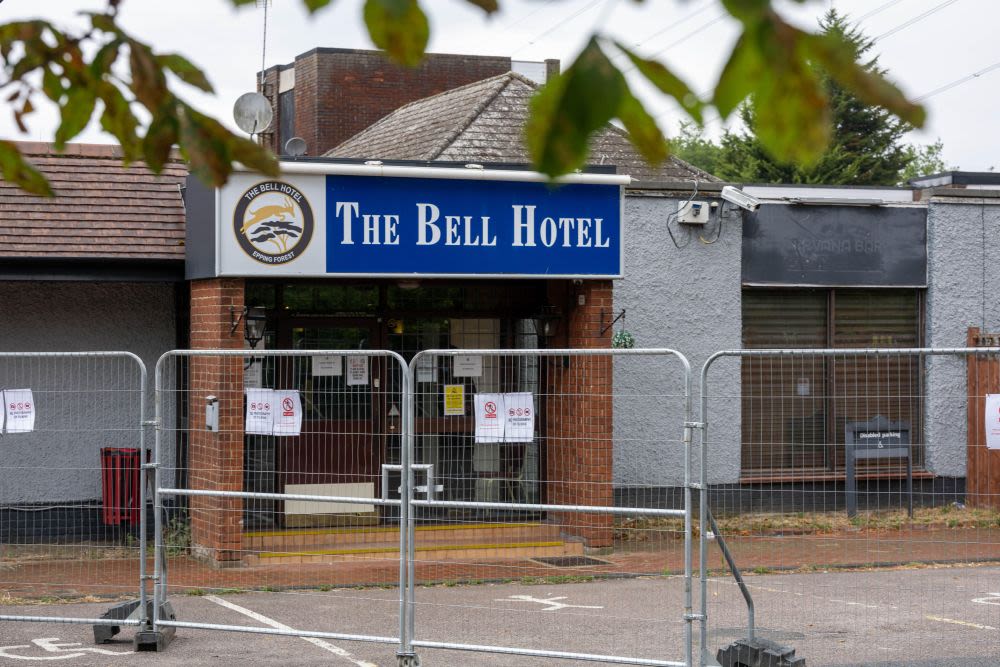
A community in uproar over the Bell Hotel’s new role
In the heart of Epping, long simmering tensions have boiled over after the Home Office quietly reopened the Bell Hotel as asylum accommodation for single adult males. Once closed in April 2024 amid fierce local opposition, the historic Bell has become a flashpoint, drawing residents, councillors and even extremists into the streets of this Essex town.
The reopening came without any consultation, leaving Epping Forest District Council and its residents blindsided. A motion demanding the Bell’s permanent closure passed unanimously at Full Council, reflecting a rare moment of cross-party solidarity. Locals feel their voices have been ignored by a distant government that treats Epping as little more than a convenient housing hub.
From families to single adults: an inappropriate pivot
When the Bell Hotel first welcomed asylum seekers in 2020, it housed women and children—still a controversial move given the hotel’s central location near schools and the high street. By 2024, relentless campaigning by councillors and community groups forced its closure. Yet this July, without warning or transparency, the Home Office repurposed the same site exclusively for single adult males.
Meanwhile, another asylum hotel operates just miles away, stretching local services to breaking point. “Epping Forest has already taken more than its fair share,” warns one councillor. Health clinics, schools and law enforcement are buckling under the extra demand, while residents face real fears for their safety—especially after two incidents linked to Bell residents: an allegation of sexual assault on a 14-year-old girl and a separate arson arrest.
Exploiting genuine concerns
Local frustration has created fertile ground for opportunistic extremists. Organisers with links to white nationalist groups have infiltrated peaceful protests, spreading hate and division under the guise of community activism. One prominent figure, known only as “The Lion of Epping,” is accused of ties to Patriotic Alternative and the far-right Homeland Party. He’s even alleged to have administered a Facebook group used to coordinate demonstrations outside the hotel.
These extremists prey on the lack of government transparency: residents know little about who is living steps from their children’s school. Such secrecy not only fuels anxiety, but also allows extremist voices to hijack the conversation, twisting legitimate grievances into a platform for broader hate.
A dangerous façade of respectability
Community leader Callum Barker—celebrated locally for organising litter picks—has resurfaced as a prominent Bell Hotel protester. But behind the benign image, Barker is alleged to be closely connected to extremist networks and to lead rallies alongside former BNP councillors. His social media presence, carefully curated with sincere-sounding calls to “help our town,” masks a radical agenda.
Similarly, Reform UK councillors have courted these same individuals, marching shoulder to shoulder in town centre demonstrations and using inflammatory language to attack elected representatives. “Every councillor here is a pig with their snouts in the trough,” one local Reform figure proclaimed outside council offices—an echo of tactics once used by the BNP.
Why Epping’s fight matters nationwide
While the focus is on this small Essex market town, its struggles mirror a wider national crisis. Across the UK, local councils face mounting pressure as central government shifts asylum accommodation costs and logistical burdens onto communities. With no strategic plan, these reactive placements erode trust in democratic processes and invite extremist disruption.
From Dover to Doncaster, towns are being used as pressure valves for asylum policy failures—treated as vacant property stock rather than communities with unique histories and needs. The result is a growing perception that government policy is both capricious and unfair.
Civic duty vs. political opportunism
Epping’s councillors have chosen the democratic path: motions, legal challenges and diplomatic pressure aimed at securing transparent dialogue with the Home Office. But extremists prefer street theatrics, chanting slogans and intimidating neighbours to achieve their political goals.
In 2023, Epping Forest voters defeated Julian Leppert of the far-right For Britain party—a stark reminder of the region’s flirtation with extremist politics. Now, the same forces have seized on the Bell Hotel issue to stoke fear and spread hate. “We have a civic duty to expose extremists, not join them,” insists one local councillor, urging residents to separate legitimate local concerns from hateful propaganda.
Demands on the Home Office
- Immediate closure of the Bell Hotel as asylum housing, restoring the site to its previous status.
- Meaningful consultation with Epping Forest District Council and community groups on any future asylum accommodations.
- Fair distribution of asylum placements across the country, so that no single area bears a disproportionate share.
- Transparent data sharing on resident numbers, criminal incidents and support services to alleviate public anxiety.
Until the Bell Hotel doors close again for good, Epping’s streets will remain a battleground between community defenders and opportunistic extremists, all underscored by a government deaf to local voices.





